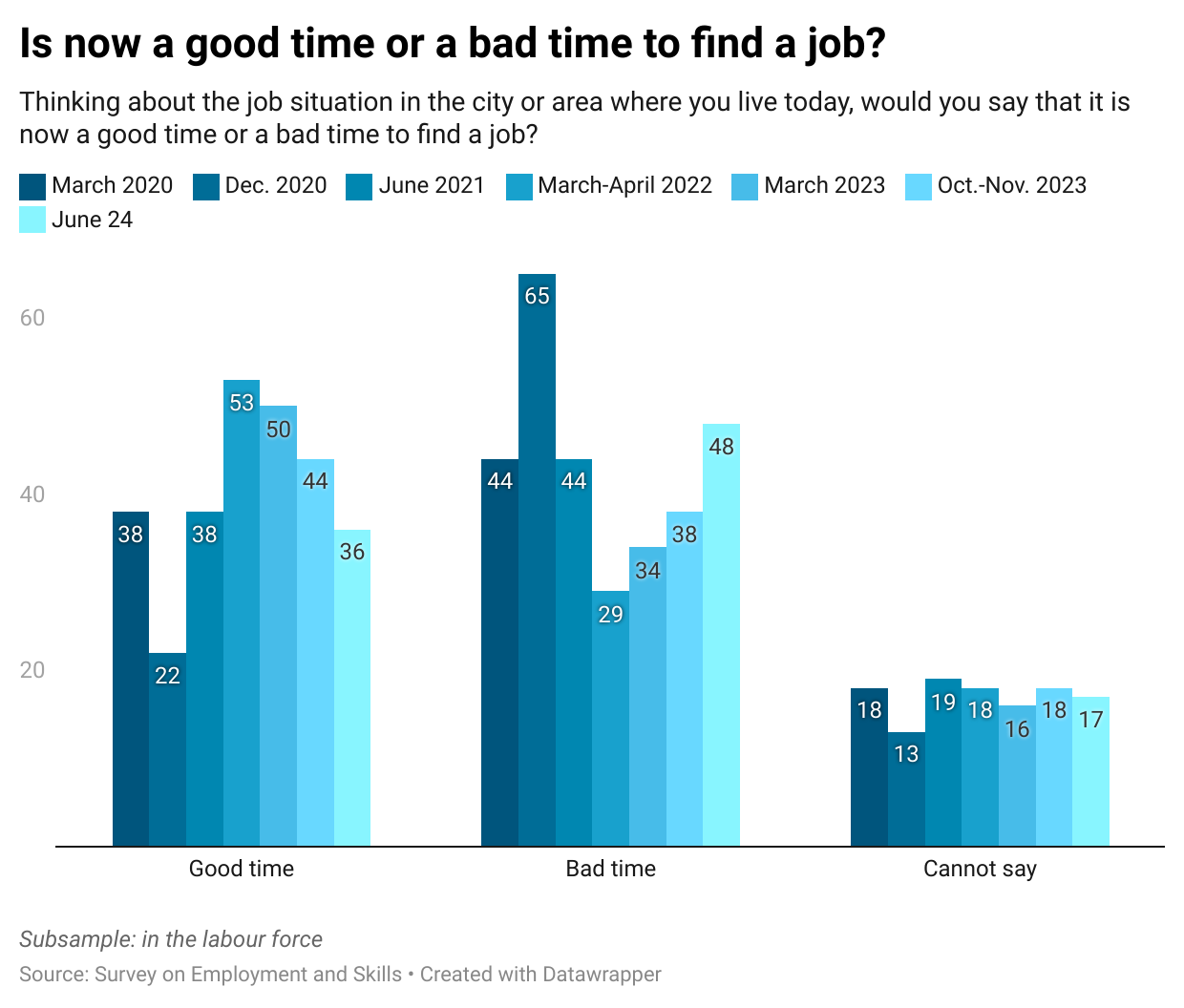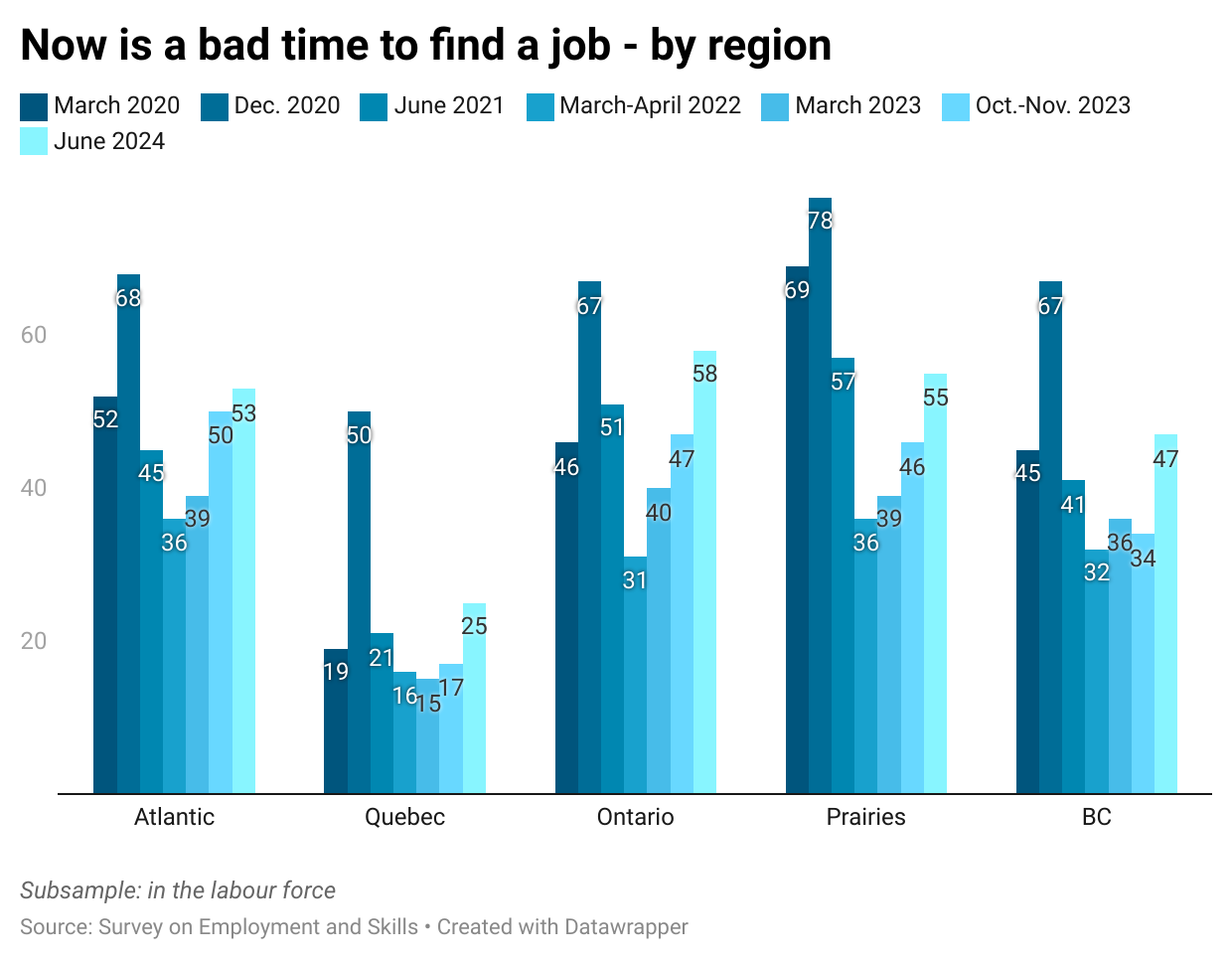Growing concerns about unemployment
A majority of younger Canadians now say that it's a bad time to find a job
According to the latest figures from Statistics Canada, unemployment in Canada is edging upwards. Specifically:
“The unemployment rate in August was the highest since May 2017, outside of 2020 and 2021, during the COVID-19 pandemic. The unemployment rate has generally trended up since April 2023, rising 1.5 percentage points over this period.”
The agency also points out that, while “the unemployment rate was up across all age groups on a year-over-year basis in August, the increase was largest for youth.” For students looking for summer employment, “the unemployment rate for the summer of 2024 was the highest since 2012.”
Against this backdrop, it’s worth taking a look at how Canadians have felt about the job market over the past several years. Since 2020, through the Survey on Employment and Skills, we’ve been regularly asking the following question:
Thinking about the job situation in the city or area where you live today, would you say that it is now a good time or a bad time to find a job?1
Up until June 2021, the picture was an encouraging one: a fairly rapid improvement after the economic disruptions caused by the pandemic in 2020. But, since then, the proportion saying it’s a bad time to find a job where they live has steadily increased, and now outweighs the proportion saying it’s a good time to find a job.
This mirrors the picture painted by a number of different indicators we track, including trust in political institutions. In mid-2021, there was light at the end of the tunnel. Most Canadians were getting vaccinated, and “omicron” was just another a letter in the Greek alphabet. Interest rates and inflation were both low. But, as the immediate emergency of the pandemic receded, concern about the economy grew, particularly concerns related to the cost of living and housing.
The regional pattern of responses to our survey question is interesting, mostly because it serves as a reminder that Quebecers continue to be much less pessimistic in their outlook than other Canadians – a defining feature of the country’s politics since about 2017.
Note that, among Ontarians, the “bad time to find a job” figure has almost doubled over the past three years.
But it’s the differences among age groups that concern us most, so here are those results. I’m going to show the same data in two different ways: first, the trend over time for each age group, and then the age differences at each point in time.
The first chart confirms that the outlook on the job market became more negative among all age groups over the first half of this year. The second chart suggests that a more pronounced age difference has emerged since 2021. A majority of Canadians in the labour force under the age of 35 now say that, in the area where they live, it’s currently a bad time to find a job.
A majority of Canadians in the labour force under the age of 35 now say that, in the area where they live, it’s currently a bad time to find a job.
What’s especially notable are the differences based on educational attainment. The conventional wisdom is that university graduates should be more insulated from the ups and downs of the economic cycle. But the chart suggests that the rollercoaster ride coming out of the pandemic and heading into wherever we are today has been steeper for university graduates than for others (although everyone is roughly on a similar track). The proportion of university graduates (age 25 to 39) who say that now is a bad time to find a job has more than doubled since 2021.
These results appear to align with the Labour Force Survey: between July and August, the unemployment rate among university graduates (age 25 and older) increased from 5.0 to 6.3 percent and is now, unusually, higher than the overall average.
Some might question the point of asking about the public’s impressions of the strength of the economy, rather than just relying on more objective measures. People who themselves hold a secure job may have no way of knowing how tough it might be getting for others. Conversely, if we hear enough bad news, we may come to believe we’re in a recession even if the quarterly GDP figures say we’re not.
But, arguably, it can work the other way around. I don’t think we can take it for granted that macro-economic indicators are always sensitive or responsive enough to pick up changes in people’s circumstances. And beyond that, regardless of what the official statistics say, the public’s sense of what’s happening with the economy matters. It shapes their consumer choices – and, ultimately, their political ones too.
I note too that the responses to the survey question started to become more negative in 2022 and 2023, before the official unemployment rate began rising. It’s always worth paying attention to public perceptions.
Before I wrap this up, I want to thank the Future Skills Centre and the Diversity Institute for supporting the Survey on Employment and Skills. Investment in regular tracking surveys in Canada is rare, but invaluable. It’s commendable that they’ve made possible a regular check-in of people’s labour market experiences covering the period during pandemic and its aftermath.
The data in this post are from the Survey on Employment and Skills. This survey is conducted by the Environics Institute for Survey Research, in partnership with the Diversity Institute at Toronto Metropolitan University and the Future Skills Centre.
The 7th wave of the study consists of a survey of 5,855 Canadians age 18 and over, conducted between May 30 and July 4, 2024, in all provinces and territories. It was conducted both online (in the provinces) and by telephone (in the territories). The author is solely responsible for any errors of presentation or interpretation.
The Survey on Employment and Skills is funded primarily by the Government of Canada’s Future Skills Centre / Le sondage sur l’emploi et les compétences est financé principalement par le Centre des Compétences futures du gouvernement du Canada.
What is the Environics Institute for Survey Research? Find out by clicking here.
Follow us on other platforms:
Twitter: @Environics_Inst or @parkinac
Instagram and Threads: environics.institute
This was a question that I first spotted in the Gallup World Poll.








